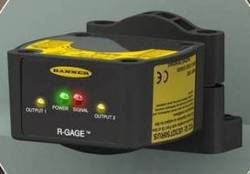Jan 31 2011
Manufacturer of photovoltaic sensors, Banner Engineering has unveiled a new retroreflective variant to its series of R-GAGE QT50R radar sensors.
The launch of the new model will enable the company to solve more complicated vehicle identification applications and efficiently detect cargo, trucks, cars, and trains. The QT50R radar sensor uses Frequency Modulated Continuous Wave (FMCW) radar to offer dependable identification of stationary or moving objects.
 Radar Sensor
Radar Sensor
The radar sensor emits a beam of high-frequency radio waves from an antenna. The internal antenna processes the reflected signal back to the receiving antenna. The sensor identifies objects present within a distance and ignores objects that are present beyond the setpoint.
The QT50R radar sensor is ideal for subways and light rail logistics, car counting for parking ramps, proximity detection for shipyard cranes, boat detection for dams and locks, and for detecting vehicles in roads.
The QT50R retroreflective model efficiently senses stationary targets that have very less radar reflection by using a retro-target or a reference signal. It delivers an effective sensing beam and has the potential to sense targets till the sensor face. The retroreflective model is ideal for tollbooths, gate control, parking ramps, train detection, and for truck trailer detection.
The sensors provide convenient sensing field configuration in the Industrial, Scientific, and Medical telecommunication bandwidth. They come in IP67 housing and can withstand wind, sun, snow, fog, rain, and dust.